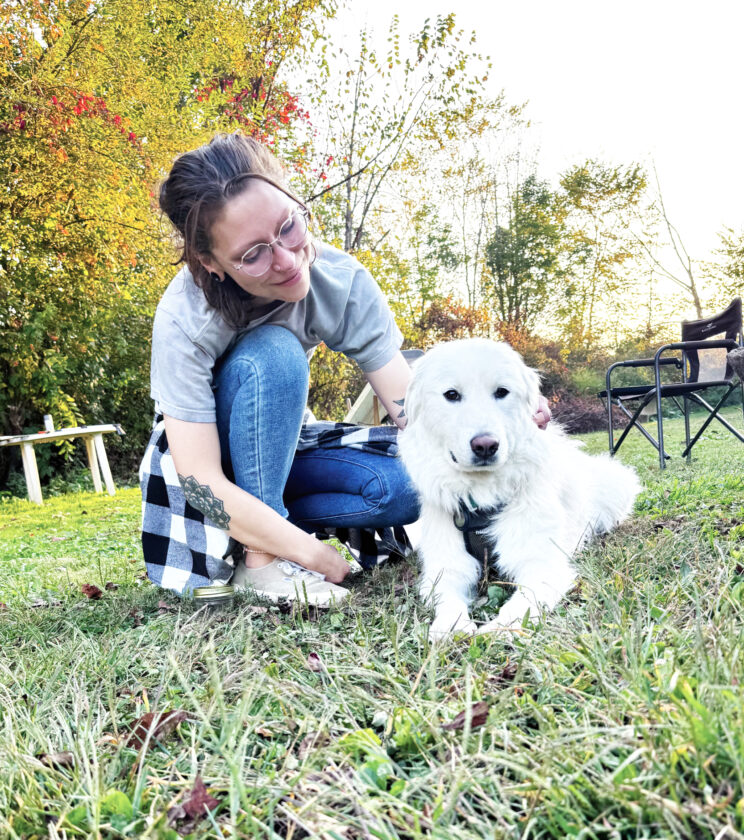The struggles of breast cancer at 25

Correspondent photo / Susan Wojnar
Katlyn “Kat” Jackson plays with her biggest supporter, Goldie, a Great Pyrenees-golden retriever mix.
Katlyn “Kat” Jackson, 27, of Youngstown, knows how long the battle with breast cancer can go on and how brutal it can be — mentally, emotionally, physically.
In a profile published by the Vindicator in October 2023, she shared with readers that she first detected a lump in April 2023.
At that time, she was living in West Virginia. A blood test revealed that she had the rare BRCA 1 genetic mutation. People who inherit this harmful mutation have increased risks of breast cancer and ovarian cancer and tend to develop cancer at younger ages than people who do not have the variant.
She was 25.
Devastated with the diagnosis, she closed her two massage therapy offices to prepare for treatment and paused her photography and artisan work.
Breast cancer runs in her family. In the 1950s, breast cancer killed Jackson’s great-grandmother and her twin sister. Her grandmother was diagnosed in the 1990s. All three were less than 45 years old.
Part of Jackson’s treatment necessitated that she go into medically-induced menopause and receive chemo treatments. During this time the mass in her armpit grew 33%.
On June 13, now at age 26, she had a single modified radical mastectomy — her right breast was removed along with her lymph nodes. Following the chemo, there was six weeks of radiation, all at the Cleveland Clinic. Because of her high risk for further cancers, she had another mastectomy, her ovaries removed and reconstructive surgery.
When I caught up with Jackson in September 2025 she indicated she was struggling with adverse mental side effects from a different hormone suppressant she was given and the chemotherapy.
“Obviously, chemotherapy is a form of dosed poison with the intention to stop any cellular growth,” she said. “Your body goes into a lethargic state; cognitive functioning is diminished. It was difficult at times to complete tasks or finish a sentence or thought.”
In the past several months, she noted, her cognitive function and memory are starting to improve. Journaling has helped as has photographing changes. She said her situation was exacerbated by her ADHD and “brain fog” from PTSD and fibromyalgia.
She is unable to work as a massage therapist, which was her main source of income.
“I have early arthritis and side effects from the estrogen suppressant,” she said. “My mental health has been seriously impacted from the financial crisis of not being able to work.”
Reflecting on what has helped her, she stated, “Art therapy has helped me cope. I have been in art therapy weekly.
Deeper healing has started making breakthroughs in my PTSD. I’ve learned to work with my resources.
The times I’ve spent in isolation from all this has given me the chance to find God, create new life terms and agreements, and give back from my experience for a greater change. I discovered that I absolutely couldn’t make it through without surrendering to a higher power.”
Jackson discussed her desire to have children and how that is being impacted by the damaging effects of chemotherapy and induced menopause. She managed to freeze 7 eggs before it was too late, thanks to Worth the Wait in Columbus.
She doesn’t have immediate plans for them, but knows she will someday.
Supports have come and gone from her life, due to four major moves since starting her journey with breast cancer.
Her uncle provides a lot of emotional support. Spending time at the Commonwealth Community Gardens on Youngstown’s North Side has allowed her to enjoy the benefits of collaborative activities. Jackson noted that gardening has helped her change to more healthy eating habits.
Her biggest supporter is her dog Goldie, a Great Pyrenees / golden retriever that she got from a shelter.
She says she is constantly amazed at how attuned he is to her emotionally.
Having him certified as a therapy dog and taking him to area hospitals to cheer other patients is something she looks forward to.
A more ambitious plan that keeps her focused is the desire to create The Goldie Locks Foundation, where people with disabilities of all types — whether they be veterans, the elderly or children — would be linked with an emotional support animal or service dog of their own.

